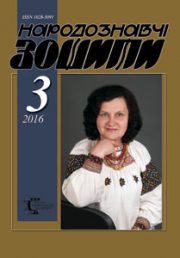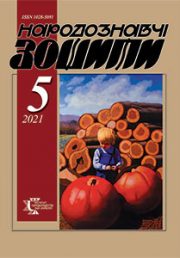The Ethnology Notebooks. 2019, 2 (146), 346—353
UDK 392.1 (477.86)
DOI https://doi.org/10.15407/nz2019.02.346
HOROSHKO-POHORETSKA Lesya
ORCID ID: https://orcid.org/0000-0002-8741-2467
Candidate of Historical Sciences (Ph.D. in history), Senior Researcher
Ethnology Institute of National Academy of Sciencesof Ukraine
15, Svobody Avenue, 79000, Lviv, Ukraine
Contacts: E-mail: horoshyna@gmail.com
Abstract. At the time of increasing interest in studying the phenomena of traditional culture the research of all its layers is actualized. Therefore, the purpose of the article author sees in the coverage of the layer of custom-ritual and world-view phenomena associated with the birth of a child. The object of research is the traditional outlook and the custom ritual culture of the inhabitants of Pokuttia, and the subject is actually the maternal cycle of maternity rituals, that is, those ceremonial realities that accompanied the appearance of a child in the area of Pokuttia and which resorted to immediately after birth. Among them — folk practices for facilitating and speeding up the birth of a child, rational and irrational (warming up, burning with herbs, drinking consecrated water, vodka, pouring cold water, massaging the abdomen, unplaiting hair, solving knots on clothes and in the house, opening the furniture, strapping by deacon’s belt), cutting and further storage of the umbilical cord, the customary instructions on the first font and the treatment of water after bathing the infant (bathing in the green, spring, consecrated water; attaching to the water herbs, flowers, sugar, honey, money, pencil; preparing a different font for boys and girls; further using of water from the font; pouring water into a designated place), etc.
The basis of the research involves author’s field research during 2013—2014 in the villages of Kolomyjs’kyj, Gorodenkivs’kyj, Sniatyns’kyj, Tlumats’kyj and Tysmenyts’kyj districts of Ivano-Frankivs’k oblast’, and works of the end of nineteenth and twentieth centuries. The methodology of this paper is based on general scientific methodological principles and the basic requirements that apply to works of historical and ethnographic direction.
It was found out that the ethnolocal version of the maternity customs of Pokuttia has specific Ukrainian features,while maintaining its distinctive manifestation.
Keywords: childbirth, woman in childbirth, child, maternity customs, Pokuttia.
Received 21.01.2019
REFERENCES
Kolberg, O. (1961). Pokucie. In Kolberg, О. (ed.). All works (Vol. 29, p. 1). Wrocіaw; Poznaс: Polskie Wydawnictwo Muzyczne, Ludowa Spуіdzielnia Wydawnicza [in Polish].
Kolberg, O. (1963). Pokucie. In Kolberg, О. (ed.). All works (Vol. 31, p. 3). Wrocіaw; Poznaс: Polskie Wydawnictwo Muzyczne, Ludowa Spуіdzielnia Wydawnicza [in Polish].
Mroczko, K. Fr. (1897). Њniatyсszczyzna. (A contribution to national ethnography). Scientific and literary guide. Vol. XXV. C. IV. S. 289—304; C. V. S. 385—402; C. VI. S. 481—498; C. VII. S. 577—595 [in Polish].
Piotrowicz, S. (1907). The quack and a fortune-teller Jewdokia Bojczuk. Folklore materials from the village Bortnik on Pokucie. People. Vol. XIII. C. II. S. 118—129; C. III. S. 216—232 [in Polish].
Pankiv, M.I. (1988). Family and family life on Pokutye (1850—1980). (Candidate dissertation). In Archive of the IN NANU (Archive of the Institute of Ethnology of the National Academy of Sciences of Ukraine). F. 1. Op. 2. Od. save 355 b. Arc. 1—188 [in Ukrainian].
Gvozdevych, S. (1998). Some aspects of prenatal customs and ordinances of Ukrainian Carpathians. The Ethnology Notebooks, 3, 278—280 [in Ukrainian].
Gvozdevych, S. (1997). The maternity ceremony of Ukrainians. The Ethnology Notebooks, 2, 111—122 [in Ukrainian].
Voznyak, V. (2003). My village — Ukraine’s blossom. Ivano-Frankivsk: Nova Zoria [in Ukrainian].
Horoshko, L.M. (2013). Field materials from Pokuttia (Kolomyjs’kyj, Gorodenkivs’kyj, Tlumats’kyj, Snyatins’kyj districts, Ivano-Frankivs’k oblast’). In Archive of the IN NANU. F. 1. Op. 2. Od. save 698. Arc. 1—116 [in Ukrainian].
Serebryakova, O.G. (2013, 2014, 2015, 2016). Pokuttia (field materials collected in Kolomyjs’kyj, Snyatins’kyj, Tlumats’kyj, Tysmenits’kyj, Gorodenkivs’kyj districts of Ivano-Frankivs’k oblast’). In Archive of the IN NANU. F. 1. Op. 2. 704. Arc. 1—489 [in Ukrainian].
Horoshko-Pohoretska, L.M. (2014). Field materials from Pokuttia (Tlumats’kyj, Tysmenyts’kyj, Horodenkivs’kyj r-ny, Ivano-Frankivs’k oblast’). In Archive of the IN NANU. F. 1. Op. 2. Od. save 736. Arc. 1—97 [in Ukrainian].
Guzii, R. (2007). From People’s thanatology: Carpathian Investigations. Lviv: IN NANU [in Ukrainian].
Radovych, R. & Silets’kyj, R. (eds.). (1996). Ceiling and a beam in the traditional construction of the Polishchuks (constructive-technological and ceremonial aspects). The Ethnology Notebooks, 2, 78—93 [in Ukrainian]
Radovych, R. (1999). Relicts of archaic Polissia dwelling. In Polissia of Ukraine: materials of historical and ethnographic research. (Issue 2, Ovruchchyna. 1995, pp. 87—98). Lviv: IN NANU [in Ukrainian].
Uzeneva, E. (2004). Matitsa. In Tolstoy, N. I. (ed.). Slavic antiquities: ethnolinguistic dictionary: in 5 volumes (Vol. 3: K (Circle) — P (Quail), pp. 201—203). Moscow: Mezhdunarodnyye otnosheniya. [in Russian].
Borysenko, V. (1994). Maternity customs and rites. In Podillia: Historical and ethnographic research (pp. 211—217). Kyiv: Dolia [in Ukrainian].
Boriak, O.O. (2009). The Midwife in cultural and historical tradition of Ukrainians: between ordinary and sacred. Kyiv: Institute of Art Studies, Folklore Studies and Ethnology of M. Ryl’skyj of the National Academy of Sciences of Ukraine [in Ukrainian].
Gavryliuk, N. (2000). Birth of a child. In Ukrainian family: Family and social life (pp. 69—83). Kyiv [in Ukrainian].
Gavryliuk, N.K. (1981). Mapping of the phenomena of spiritual culture (According to the materials of the birthing rituals of Ukrainians). Kyiv: Naukova Dumka [in Russian].
Gvozdevych, S. (2004). Local features of maternity rituals of Ukrainians in Transcarpathia. Scientific herald of Uzhgorod University. Series: History. Issue 10, 173—194 [in Ukrainian].
Gvozdevych, S. (1997). Maternity rites of Polishchuks. In Polissia of Ukraine: materials of historical and ethnographic research (Issue 1, Kyivs’ke Polissia. 1994, pp. 164—171). L’viv: IN NANU [in Ukrainian].
Gvozdevych, S. (2002). Maternity customs and ordinances. In Lemkivshchyna: Historical and ethnographic research (Vol. 2: Spiritual culture, pp. 64—74). Lviv: IN NANU [in Ukrainian].
Guzii, R., & Horoshko, L. (2010). Maternity customs and ordinances in Starosambirschyna (on the basis of field research materials). The Ethnology Notebooks, 5—6, 611—617 [in Ukrainian].
Zdoroveha, N. (1983). National customs and rites. In Boykivschyna: Historical and ethnographic research (pp. 232—248). Kyiv: Naukova Dumka [in Ukrainian].
Siavavko, E. (1987). Family Rites. In Hutsul’shchyna: Historical and ethnographic research (pp. 302—319). Kyiv: Naukova Dumka [in Ukrainian].





